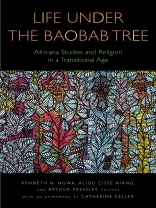Life Under the Baobab Tree: Africana Studies and Religion in a Transitional Age is a compendium of innovating essays meticulously written by early and later diaspora people of African descent. Their speech arises from the depth of their experiences under the Baobab tree and offers to the world voices of resilience, newness/resurrection, hope, and life. Resolutely journeying on the trails of their ancestors, they speak about setbacks and forward-looking movements of liberation, social transformation, and community formation. The volume is a carefully woven conversation of intellectual substance and structure across time, space, and spirituality that is quintessentially “Africana” in its centering of methodological, theoretical, epistemological, and hermeneutical complexity that assumes nonlinear and dialogical approaches to developing liberating epistemologies in the face of imperialism, colonialism, racism, and religious intolerance.
A critical part of this conversation is a reconceptualization and reconfiguration of the concept of religion in its colonial and imperial forms. Life Under the Baobab Tree examines how Africana peoples understand their corporate experiences of the divine not as “religion” apart from its intimate connections to social realities of communal health, economics, culture, politics, environment, violence, war, and dynamic community belonging. To that end Afro-Pessimistic formulations of life placed in dialogic relation Afro-Optimism. Both realities constitute life under the Baobab tree and represent the sturdiness and variation that anchors the deep ruptures that have affected Africana life and the creative responses. The metaphor and substance of the tree resists reductionist, essentialist, and assured conclusions about the nature of diasporic lived experiences, both within the continent of Africa and in the African Diaspora.
สารบัญ
Introduction : Life Under the Baobab Tree:
Africana Studies and Religion in a Transitional Age
Kenneth N. Ngwa, Aliou Cissé Niang, and Arthur Pressley | 1
PART 1: UN/FOLDING IDENTITIES
Archangel Gabriel Speaks to Mary
Pamela Mordecai | 23
1. Nella Larsen’s Quicksand: Mourning through Biracial Identities
Arthur Pressley | 29
2. Body as Praxis: Disarticulating the Human from Ownership and Property
An Yountae | 57
3. What It’s Like to Be a Blackened Body, and Why It’s Like That: A Preliminary Exploration
Desmond Coleman | 75
4. The Rhizome and/as the Tree of Life: The Relational Poetics of Wisdom and Decolonizing Biblical Studies
A. Paige Rawson | 92
5. Senghorian Négritude and Postcolonial Biblical Criticism
Aliou Cissé Niang | 126
PART 2: AFRICANA ACTIVISM
Litany on the Line
Pamela Mordecai | 171
6. God Killed! God Interrupted, Long Live the People!: Political Theory in Religious Act
Nimi Wariboko | 173
7. “Doing the Will of God” as Loving God Whose Way Is Peace
Aliou Cissé Niang | 195
8. Mysticism and Mothering in Black Women’s Social Justice Activism: Brazil/USA
Rachel Elizabeth Harding | 223
9. A Theopoetics of Exodus and the Africana Spirit in Music
Sharon Kimberly Williams | 235
10. Must We Burn Isaac?: A Four-Part Hermeneutical Fantasy for Africana Epistemology
Minenhle Nomalungelo Khumalo | 250
PART 3: AFRICANA HISTORIOGRAPHIES AND MEMORIES
Temitope Temitope
Pamela Mordecai | 273
11. From White Man’s Magic to Black Folks’ Wisdom
Althea Spencer Miller | 275
12. Solidarity by Sharing Power: An Inculturated Organic Storytelling of Jonah and Mami Wata
’Shola D. Adegbite | 307
13. Envisioning Africana Religions:
Seeking a Distinctive Voice for the Study of Religions in Africa and the African Diaspora
Salim Faraji | 328
14. Interpreting from the Back/Black-Side: Exodus through the Shawl of Memory
Kenneth N. Ngwa | 355
15. Conjuring Lost Books:
(Re-)membering Fragmented Litanies at the Intersection of Africana and Biblical Studies
(The Rev. Canon) Hugh R. Page Jr. | 400
Afterword
Catherine Keller | 409
List of Contributors | 413
Index of Modern Authors | 419
Index of Ancient Documents | 427
เกี่ยวกับผู้แต่ง
Catherine Keller is George T. Cobb Professor of Constructive Theology in The Graduate Division of Religion, Drew University. She works amid the tangles of ecosocial, pluralist, feminist philosophy of religion and theology. Her books include Face of the Deep: A Theology of Becoming; On the Mystery; Cloud of the Impossible: Negative Theology and Planetary Entanglement; Political Theology of the Earth: Our Planetary Emergency and the Struggle for a New Public. She has co-edited several volumes of the Drew Transdisciplinary Theological Colloquium, most recently Political Theology on Edge: Ruptures of Justice and Belief in the Anthropocene. Her latest monograph is Facing Apocalypse: Climate, Democracy, and Other Last Chances.







![ปกของ Brian Schrag & Julisa Rowe: Community Arts for God's Purposes [Chinese] 貼近神心意的社群藝術 ปกของ Brian Schrag & Julisa Rowe: Community Arts for God's Purposes [Chinese] 貼近神心意的社群藝術](https://static.worldofdigitals.com/thumb_webp/740/9781645083740.webp)




